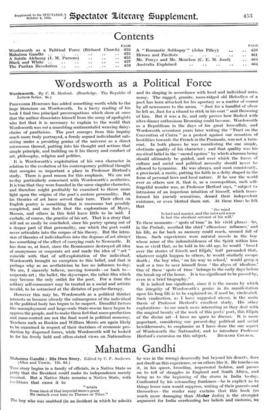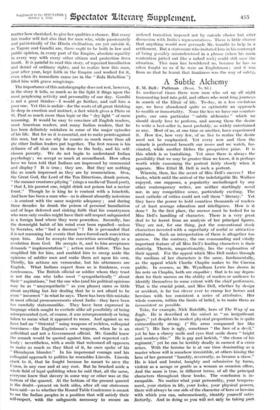, Mahatma Gandhi
Mahatma Gandhi : His Own Story. Edited by C. F. Andrews. (Allen and Unwin. '12s. Od.) Tars story begins in a family of officials, in a Native State so Petty that the Resident could make its independence merely nominal. But a Native State remains a Native State, with traditions that cause it to "retain Some tinet of that imperial murex grain
No earraek ever bore to Thames or Tiber."
The boy who Was snubbed (in an incident in which he admits he was in the wrong) deservedly but beyond his deserts, does not dwell on this experience, or on others like it. He touches on it, in his queer, brooding, impersonal fashion, and passes on to tell of struggles in England and South Africa,. and bring us to the beginning of the storm in India to-day. Confronted by his astounding frankness—he is explicit as to things lesser men would suppress, writing of their parents and themselves—the reader may exclaim that this book (so much more damaging _than Mother India) is the stronggst argument for India overhauling her beliefs and ritistonii,iso
matter how cherished, to give her qualities a chance. But every fair reader will feel also that for men who, while passionately and patriotically of the Hindu civilisation, are yet outside it, as Tagore and Gandhi are, there ought to be both in law and public opinion, in every part of the Empire, absolute equality in every way with every other citizen and protection from insult. It ispainful to read this story, of repeated humiliation and denial of ordinary rights, and to realize how this man, year after year, kept faith in the Empire and worked for it, even when its immediate Cause (as in the "Zulu Rebellion ") filled him with grave misgivings.
The importance of this autobiography does not rest, however, in the story it tells, so much as in the light it flings upon the most perplexing activity and personality of our day. Gandhi ' is not a great thinker—I would go further, and call him a poor one. Yet this is unfair—for the roots of all great thinking lie deep in emotion and instinct, a fact which gives a Plato or St. Paul so much more than logic or the "dry light" of mere reasoning. It would be easy to convince all English readers, most American readers, and many Indian readers, that he has been definitely mistaken in some of the major episodes of his life. But for us it is essential, not to make points against this man, but to see why he counts so much more than all the other Indian leaders put together. The first reason is his defiance of all that can be done to the body, and his self- chosen poverty. We do not begin to understand Indian psychology ; we accept so much at secondhand. How often have we been told that Indians are impressed by ceremonial and display ? It is true ; they are. But they are nothing like as much impressed as they are by renunciation. Siva, the Great God, the Lord of the Ten Directions, drank poison, "the meaner creatures pitying" (sings a medieval Tamil poet), "that I, his poorest one, might drink not poison but a nectar fount." Though he is king he is content with a loincloth. And here has been a man who—as is almost absurdly notorious —is content with the same majestic adequacy ; and during three decades he drank the poison of personal humiliation and of hope deferred and sinking faith that his countrymen who were only coolies might have their self-respect safeguarded in a foreign land where they were powerless. Secondly, has the downright habit of his mind ever been equalled—unless by Socrates, who "had a daemon " ? He is persuaded that it is not reasoning but events that have forced each conviction upon him. And he accepts the conviction accordingly as a revelation from God. He accepts it, and to him acceptance demands " implementation " ; action must follow. This has simplified life for him, and enabled him to sweep aside the opinions of subtler men and make them act upon his own. Thirdly, his actions are vernacular, but his utterances are English. What Indians expect from us is frankness, even carelessness. The British official or soldier whom they trust is not the one who talks most " sympathetically " about their" aspirations," but the one who (and his political opinions may be as " unsympathetic " as you 'please) cares so little about anything but fair dealing that he is not afraid to be even" incorrect" in what he says. There has been this mistake in most official pronouncements about India—they have been too carefully statesmanlike. They have been expressed in language which sought to exclude alike all possibility of being misrepresented (yet, of course, it was misrepresented) or being taken to mean.what it appeared to mean. And against us we have had an " Oriental " using weapons of reckless, colloquial breeziness—the Englishman's own weapons, when he is an individual and not a Government official. Mr. Gandhi knew the remark would be quoted against him, and requoted end- lessly ; nevertheless, with a smile that welcomed all opposers to make as much as they liked of it, he once spoke of his "Himalayan blunder." In his impersonal courage and his colloquial approach to politics he resembles Lincoln. Lincoln stuck to it, that he fought because he meant to save the Union, in any case and at any cost. But he brushed aside a whole field of legal quibbling when he said that, all the same, everyone knew that slavery in some way or other was at the bottom of the quarrel. At the bottom of the present quarrel is the doubt—present on both sides, after all our statesmen have said—as to whether the Round Table Conference is meant to see the Indian peoples in a position that will satisfy their self-respect, with the safeguards necessary to ensure an
ordered transition imposed not by outside choice but after discussion with India's representatives. There is little chance that anything would now persuade Mr. Gandhi to help in a settlement. But a statesman who imitated him in his contempt of being possibly misunderstood in a phrase (when his main contention jutted out like a naked rock) could still save the situation. This man has bewildered us, because he has so often fought us as if he were an Englishman ; and it was from us that he learnt that frankness was the way of safety.





















































 Previous page
Previous page